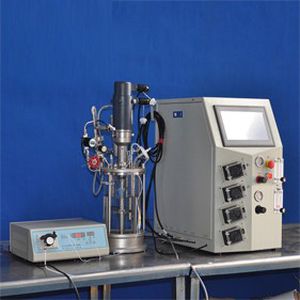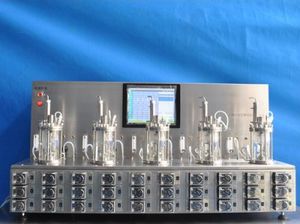

- Products
- Catalogs
- News & Trends
- Exhibitions
Stirred-tank bioreactor / fermentor GJA seriesfor the pharmaceutical industryfloor-standingglass
Add to favorites
Compare this product
Characteristics
- Type
- stirred-tank
- Applications
- for the pharmaceutical industry
- Configuration
- floor-standing
- Material
- glass, stainless steel
- Other characteristics
- sterilize in place
Description
Load Proportion 65-80% of total volume, 70% optimum
Vessel Material glass body and stainless steel lid and bottom
The high ratio: 2:1
Mixing method: Mechanical drive
Sterilization method: In situ sterilization
Control system: Siemens PLC, industrial LCD touch computer control, parameters can be set to store, can be remotely connected to the computer through the USB interface, the data
Stirring system
high-powered stirring oar, antifoam oar; AC electrical machine: infinite speed variation; rpm in the fermenter: 70~1200rpm±1%,The height of the stirring oar can be adjusted, too.
Temperature detection and control
Heat by thermostatic water tank and circulate by circulating pump(Grundfos, Denmark), autocontrol (cooling) water+5°C)~65°C±0.1°C, temperature probe(US)
pH detection and control
2.00-12.00±0.05pH, autocontrol by adding acid and base, pH sensor (Mettler, Switzerland) and shielding lead (Mettler, Switzerland). fermenter is autocontrolled with peristaltic pump
DO detection and control
0-150±3% displaying precision 0.1%, sensor (Mettler, Switzerland) and shielding lead (Mettler, Switzerland)
Feed control
fermenter uses peristaltic pump (Longer) to add meterials
Antifoam control
Tested by sencor and added antifoamer by peristaltic pump
Intake control (air) :manual control rotameter
pressure detection and control
Pressure Control: Pressure meter and digital display and digital remote control, pressure control
Related Searches
- Laboratory-scale reactor
- Bioreactor
- Fermenter
- Bioreactor / fermentor
- Stirred-tank reactor
- Process bioreactor
- Benchtop reactor
- Glass reactor
- Benchtop bioreactor / fermentor
- Bioreactor / fermentor for the pharmaceutical industry
- Laboratory bioreactor / fermentor
- Automated bioreactor
- Stirred-tank bioreactor / fermentor
- Stainless steel bioreactor / fermentor
- Benchtop bioreactor
- Bioreactor for the pharmaceutical industry
- Glass bioreactor
- Stainless steel bioreactor
- Glass bioreactor / fermentor
- Laboratory-scale bioreactor
*Prices are pre-tax. They exclude delivery charges and customs duties and do not include additional charges for installation or activation options. Prices are indicative only and may vary by country, with changes to the cost of raw materials and exchange rates.










